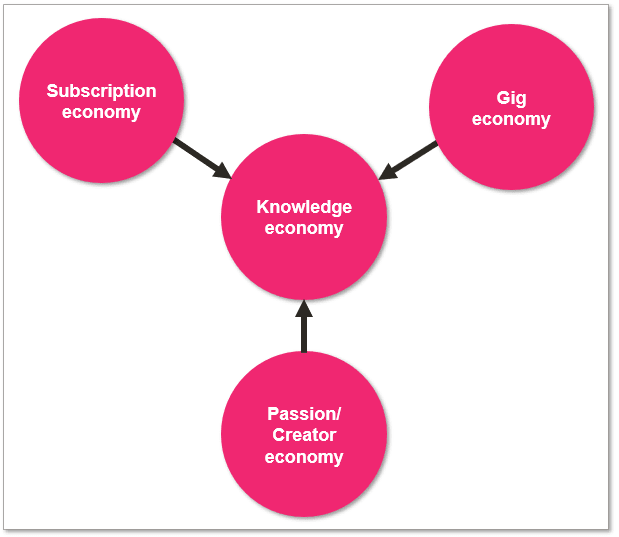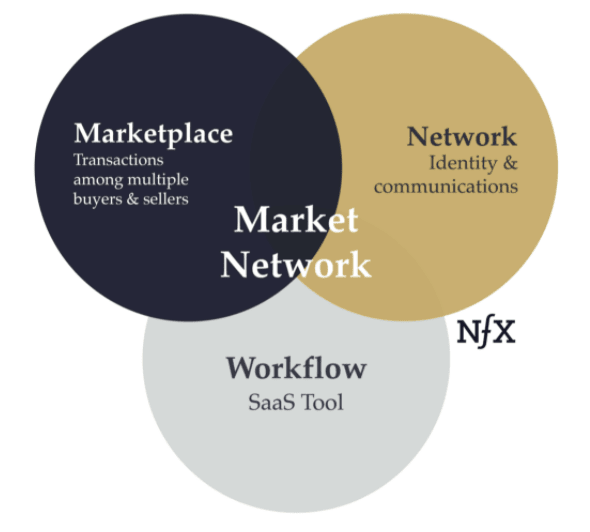Market forces, shifts in how we work, and emerging business models are starting to shape the future of professional services which, as a sector, despite its sophistication and size, has been slow to digitally transform. Is a storm about to hit?
I have written before about what the passion economy means for the future of professional services but it isn't just the passion economy that is a force for change. The gig economy impacts knowledge workers too, as does the shift to recurring revenue models in the subscription economy. The knowledge economy that underpins professional services is at the confluence of all these macro trends:

1. What are 'market networks' and why are they the future for professional services?
NfX wrote an excellent piece on why the next 10 years will be about market networks and predict that "market networks will produce a new class of unicorn companies and impact how millions of service professionals will work and earn their living." They visualise how networks, marketplaces and workflow come together to create 'market networks':

Also worth reading on this topic is Li Jin's What’s next for marketplace startups? Reinventing the $10 trillion service economy. Li is famous for coining the term 'passion economy' and explains how the passion economy will impact the future of work - all of this is highly relevant to professional services which is delivered in an increasingly digital and global manner. Expertise will be 'on-demand' globally and discoverable via market networks and specialist communities.
2. Why will they be community-powered?
The (re)rise of digital communities is due to many factors:
Ongoing macro trends:
- Digital transformation - our ways of working are clearly shifting to digital channels and this includes how professionals will market themselves, find new clients, nurture existing relationships, and deliver work. The in-person communities and networking of the past will inevitably shift online.
- Gig economy, remote working, portfolio roles, micro-businesses, global connectivity, passive income, working later in life... all these trends necessitate digital ways to connect and collaborate with others and digital communities of expertise are the obvious way to do so.
- Trust has moved away from institutions, including brands, to people & peers - this is well-evidenced in market research, like Edelman's Trust Barometer, and it applies to professional services also. Organisational brands are carrying less importance and professionals are turning to peers for advice and support just as consumers are turning to friends and family via social media. Professional communities of expertise are places to which trust is migrating.
- Customers and employees seeking a more emotional engagement with brands - research shows this to be true particularly with younger generations of professionals for whom things like purpose, authenticity etc are important in deciding who they want to work with. Once again the emotional nature of communities, to which one can feel a genuine sense of belonging, fits well with this macro trend.
- Waning engagement due to saturation in existing digital marketing channels - social, email, content marketing, webinars, white papers etc have been the staple digital marketing channels for marketing professional services. But they have become increasingly noisy, saturated, expensive and engagement rates are falling. Communities offer a way to cut through this and create more meaningful connections and conversations. We have a written a free guide on community-based marketing if you want more detail on this approach.
Recent trends:
- Impact of Coronavirus - this has made digital forms of communication and connection a necessity rather than a nice to have. It also means we have a strong need to connect, to belong, to counter the distancing and alienation we have to live with. And digital communities can help make up for lost networking and conversations that might otherwise have happened at in-person events.
3. It's still about who you know in professional services
Professional services was always about 'who you know' and your networks were very important for access to the right people to maximise your chances of success. This had its downsides - elitism, favouritism, exclusiveness, privilege etc.
The world has become more connected and there are many exciting new business models emerging in professional services and new ways to connect with other professionals all around the world.
But... professional services is still about people, about relationships, about trust.
It's just that the way you can build trust and nurture valuable relationships is changing - and digital professional communities of expertise are at the core of this.
Add in a means to trade (i.e. sell / monetize) your expertise, rather than merely share it, and you have a community-powered market network - these will enable all sorts of new ways of working and earning a living, from anywhere in the world, that are truly exciting and empowering for experts and knowledge workers!
Join Guild 🤝
See for yourself how the Guild experience is different to WhatsApp, Slack, LinkedIn or Facebook Groups.
Guild is a safe space to connect, communicate and collaborate with others.
Join us on a platform that is purpose-built for creating groups, communities and networks on mobile.